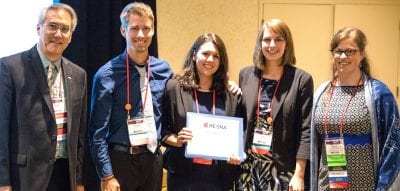There were over 70 submissions to the 2017 RESNA Student Design Competition, and over 40 colleges and universities participated.

Roger Smith (President, RESNA); Steven Erickson, Dylan DeBerardine, Zoé Lauters (University of Central Florida); Emma Smith (Chair, RESNA Student Design Competition)
First prize was awarded to tÜthbrush (University of Central Florida). As described by the students, tÜthbrush “has been created to eliminate the wrist and arm movement necessary with a standard toothbrush in order to provide a better way to maintain an acceptable level of oral hygiene”. tÜthbrush also was awarded the TREAT prize for “Technology Most Likely to Become Commercially Available”.

Roger Smith (President, RESNA); Abilee Kellett , Justin Turner (University of British Columbia); Emma Smith (Chair, RESNA Student Design Competition)
Second prize was awarded to ChairStairs, an assistive technology device for independent wheelchair-to-ground transfers (University of British Columbia).

Roger Smith (President, RESNA); Bobby Gobao, Jim Nixon (Pennsylvania State University); Emma Smith (Chair, RESNA Student Design Competition)
Third prize was awarded to Evaluation Software for Computer Application Methods (Penn State University).
Eight finalists were identified from the more than 70 submissions received. All finalists received an opportunity to present at the 2017 RESNA conference in New Orleans, LA, with funding support from the National Science Foundation.
- Adjustable Grab Bar: A height adjustable grab bar using a hand crank Queen’s University
- AXIS: Portable Folding Wheelchair Transfer Board CalTech & Art Centre College of Design
- ChairStairs: AT device for wheelchair-to-ground transfers University of British Columbia
- Evaluation Software for Computer Application Methods Penn State University
- FLICO: Upper limb exercise device for home rehabilitation Soon Chun Hyang University
- Plugs for Molly Stanford University
- Single Switch Technology for Teaching Adolescents to Scan Penn State University
- tÜthbrush: the U-shaped toothbrush University of Central Florida
Shuffle Speller received first prize in the 2017 RERC on AAC Student Research and Design Competition
RESNA 2018 will be held in Washington, DC, from July 11-15, 2018
*All photos by John Anschutz

